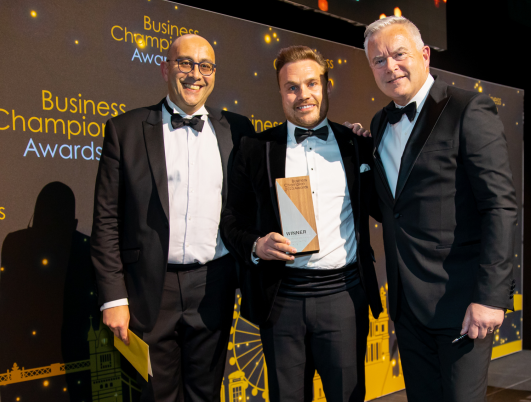Will Polston was named Business Enabler of the year at the annual Business Champion Awards. The presentation was made by the BBC’s Huw Edwards
Being stuck is frustrating, demotivating and can drain energy faster than an outdated iPhone. With that in mind, award-winning business strategist and performance coach Will Polston, right, knows the importance of helping people get unstuck fast. Will focuses on getting people to master their mindset, productivity and efficiency so they can live a life they love. Here are Will’s top five ways of breaking through barriers so you can feel inspired, fulfilled and energised.
Will focuses on getting people to master their mindset, productivity and efficiency so they can live a life they love. Here are Will’s top five ways of breaking through barriers so you can feel inspired, fulfilled and energised.
North Star Thinking
So many people are focused on what they need to do next and find themselves getting stuck. It might seem strange, but the place to start is at the end. By getting clear on the North Star (the end goal) you can reverse engineer the progress to work out what needs to be done first. This can be goals 10 years out, then five years, three years, one year, 90 days, 30 days and then finally a specific action that can be taken today. You can then use the North Star as the guiding light and the other goals nearer to the present moment as milestones.
When I first wanted to build my coaching and training company I knew I wanted to empower people. I just couldn’t work out what to do first so I procrastinated for 18 months. It was only when I had worked backwards at what a trajectory could look like that I realised the very first step could be posting a daily motivational quote on social media. A week later that led to creating a basic website, which a week later led to me writing my first blog. After three months, I had built up a 10,000 social media following and in month four I ran my first event.
The rest, as they say, is history.
There is no such thing as a lack of resources
So often we find ourselves using the excuse of a lack of resources. Not enough time, not enough money, not enough help – the list goes on.
This is highly disempowering.
To combat this, I have found adopting a simple belief can change this forever. So much so I have it framed on my desk. That mantra is: “There is no such thing as a lack of resources, only a lack of resourcefulness”.
By having this as a core belief it empowers us to take responsibility and be creative in keeping the wheels of progress in motion.
Who – not how
Any problem is simply an unasked or unanswered question. That said, too often people start their questions with “how” but the trick is to reorder the letters from how to “who”.
One of the fastest ways to get an outcome is to identify “who” is likely to have the solution you need or if you don’t know, then who do you know that may know someone that has the solution? A great way to find this is to ask someone with the five magic words…
“I need your help, please”.
You’ll be amazed at how many people are willing to help when you start a conversation with them, it certainly works better than starting it with “Abracadabra!”.
Fun Fact: the original meaning of abracadabra means “I will create as I speak” which, arguably, you are doing by asking: “I need your help, please!”
A challenge, not a problem – words create worlds
Having to deal with problems typically drains energy and tends to be avoided until they can’t be avoided any more. A simple reframe of a situation being a pain in the backside problem to an inspiring challenge can be enough to get cracking with it. Most people love a challenge. A challenge is exciting and something to look forward to, an opportunity to “rise to the challenge”, as the saying goes.
If you don’t like something…
The Stoics taught us there are only three things we control: our actions; our perceptions; and our decisions. So, if you don’t like something change it and if you can’t change it then change the way you think about it.
Whilst the above points can help us change it, a simple and effective way to change the way we think about something is to get grateful for it. No matter how bad you may perceive something to be there is always a way of getting grateful for it.
So many times in our life we look back with hindsight at tough times and see that they serve us. The issue often was that in the moment of the tough times we suffered due to not realising how it was serving us. So often in life, our lowest lows have a direct correlation to our highest highs. Rather than use hindsight we can use foresight by identifying how the current challenge is serving us in our values (highest priorities).
In the same way that if grains of sand were being added to a balance scale that has a brick on the other side, eventually it will balance out, by identifying multiple benefits no matter how small when collated together can be equal in weight and therefore create a balanced mind so the negative emotions or the emotional baggage dissolves.


